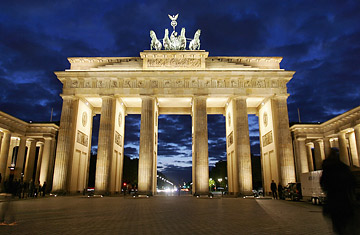
Berlin's Brandenburg Gate
Berlin has not always been a friendly place for American politicians. Shortly after the Soviet Union began construction of the Berlin Wall, John F. Kennedy sent Vice President Lyndon Johnson to West Berlin. "They'll be a lot of shooting and I'll be in the middle of it," Johnson told an aide. "Why me?" Seven years later, West German leftists plotted to hurl pudding-filled balloons at Hubert Humphrey during his trip to the city; the police managed to disrupt the plan, but Humphrey was booed and heckled everywhere he went. And while history remembers Ronald Reagan's challenge to Mikhail Gorbachev to tear down the Wall, it's usually forgotten that Reagan's visit to West Berlin occasioned the worst rioting the city had seen since the 1960s, prompting officials to shut down the city's subway system for the only time in its history.
Barack Obama will surely receive a warmer reception in Berlin next week. But the mini-controversy that has surrounded his planned visit highlights the mix of admiration and suspicion with which Berliners view presidential pilgrimages to their city. The current source of dispute is Obama's purported desire to give a speech in front of the Brandenburg Gate, the backdrop for Reagan's 1987 address. Through a spokesman, German Chancellor Angela Merkel has said she regards the possibility of Obama's speaking there "with a certain bewilderment ... No German politician would come up with the idea to do such a thing at the National Mall in D.C."
To some, it's Merkel's bewilderment that's bewildering. Speculation abounds that the White House pressured the Germans to deny Obama his made-for-cable-TV moment. So far not a shred of evidence has surfaced, but the whole affair led at least one German commentator to call on Obama to "put all this fuss to an end," have a quick tea with Merkel, pose for some pictures and get out of town.
Why the touchiness? Berlin has long been used by presidential image-makers as a political prop. During the Cold War, the city was the proving ground of the East-West conflict, the principal theater in the struggle between freedom and authoritarianism. Truman made the first presidential visit to postwar Berlin, driving through the ruins of the city in the wake of the Allied bombardment. The Allies' refusal to abandon the city to the Soviets, demonstrated most dramatically during the Berlin airlift of 1948, endeared a generation of Berliners to the U.S. When Kennedy arrived in Berlin in 1962, the city was gripped by something approaching mass hysteria; Kennedy later confided that had he called on the throng — an estimated 750,000 witnessed his "Ich bin ein Berliner" speech at Schoenberg City Hall — to tear down the Wall, they would have done it.
Kennedy's speech was highly choreographed: in the book Kennedy in Berlin, Andreas W. Daum writes that the White House wanted Kennedy "to see, to be seen and to publicize this visibility as much as possible throughout the world for the benefit of those not participating." Reagan's visit in 1987 was a similar exercise in stagecraft, orchestrated by the Michael Deaver—trained White House Advance office. Early that year, U.S. officials in Berlin approached the WEST German authorities with the idea of Reagan's speaking in front of the Reichstag or the Brandenburg Gate, in view of the Wall. The Berlin officials adamantly opposed the idea, fearing disturbances on the eastern side of the Wall. Once they got a glimpse of the Brandenburg backdrop, though, Reagan's men knew they had their site. "I've always felt that the content was driven by the location," says Jim Hooley, the head of Reagan's advance office. "The speechwriters came away inspired by the fact that Reagan would be giving the speech with the Wall at his back. Could you imagine Reagan saying, 'Tear down that wall that's over there three miles away, Mr. Gorbachev?'"
As it turns out, though, Kennedy and Reagan are remembered today less for the staging that went into their visits than for the power of the words they delivered. The two phrases that resonate — "Ich bin ein Berliner" and "Tear down this wall" — embodied the personalities of both Presidents and their intuitive flair for the moment; in both cases, Kennedy and Reagan personally saw to it that those phrases stayed in their speeches, despite the misgivings of some of their aides. Even more importantly, though, both speeches underscored the U.S.'s unshakable commitment to a free and unified Europe, a resolve that helped bring an end to the Cold War. Obama has yet to show that kind of clarity in articulating how to promote American ideals and interests in a much different world, but now would be a good time to do so. In the end it won't matter whether he speaks in front of the Brandenburg Gate. What matters is what he says.
— Additional research by Laura Fitzpatrick
